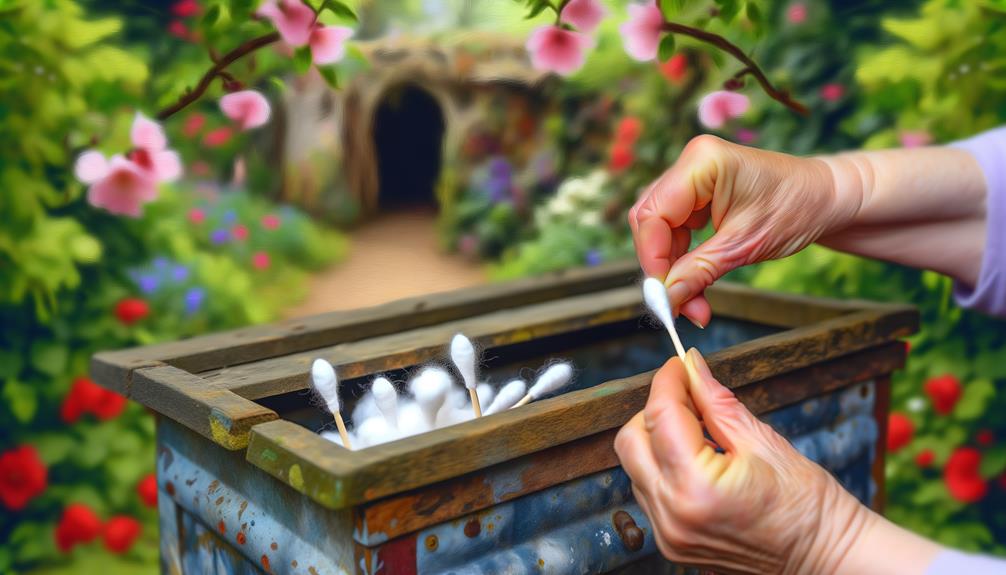

You can compost cotton swabs if they’re made from 100% cotton and have paper or wooden sticks. Organic cotton biodegrades well, taking just a few months in a compost pile. Avoid swabs with plastic sticks, as they won’t decompose and will harm the environment. For best results, check the swabs are untreated and don’t add too many at once to maintain compost balance.
Composting these swabs reduces landfill waste and enriches your soil with nutrients. By managing your compost properly, you can make a positive environmental impact. Learn further details about eco-friendly practices and proper composting techniques.
Cotton swabs typically consist of three main materials: cotton, plastic, and paper. Understanding these components helps you decide if they’re suitable for composting.

The cotton used in swabs comes from cotton production, where cotton plants are harvested and processed. This cotton is then attached to the ends of swabs during the swab manufacturing process.
Some swabs use plastic sticks, which aren’t compostable, while others use paper sticks, which break down more easily. When choosing cotton swabs, look for those with paper sticks and organic cotton to make sure they’re more environmentally friendly.
You might be pleased to know that cotton, particularly when it’s organic, often biodegrades quite efficiently. This makes it an excellent material for composting. The process starts in cotton farming, where organic practices avoid harmful chemicals, guaranteeing the cotton breaks down naturally.
When you dispose of cotton in your compost, it typically decomposes within a few months, returning nutrients to the soil.
Moreover, consider fabric recycling as another eco-friendly option. If you have old cotton fabrics, they can be repurposed or recycled, reducing waste. By composting cotton swabs and recycling cotton fabrics, you’re contributing to a sustainable cycle.
Always check if the cotton is untreated and free from synthetic additives to make sure it composts efficiently.
When considering the environmental impact of swab sticks, it is important to compare wood and plastic options. Wood sticks decompose much faster and have a lower environmental footprint than plastic.
Plastic sticks, however, take much longer to break down and contribute to pollution.
Evaluating the environmental impact of swab sticks hinges on whether they’re made of wood or plastic. Wood swab sticks, typically sourced from renewable forests, have a lower environmental footprint. However, the manufacturing origin is vital—local production reduces transportation emissions.
Plastic sticks, derived from petroleum, involve harmful extraction processes and contribute to long-term pollution. Consider your usage frequency. If you often use swabs, wood options are generally more sustainable. They decompose faster and don’t introduce microplastics into the environment.
On the other hand, plastic swabs, while more durable, pose significant environmental risks. By choosing wood, you support eco-friendly practices and reduce waste. Always check the packaging for information on the materials and origins to make informed decisions.
Comparing the decomposition rates of wood and plastic swab sticks reveals stark differences in their environmental impact. Wood swab sticks decompose much faster due to higher microbial activity, especially in industrial composting. Conversely, plastic swab sticks take considerably longer to break down, often persisting for decades.
Here’s a quick comparison:
| Material | Decomposition Rate |
|---|---|
| Wood | Months |
| Plastic | Decades |
In an industrial composting setup, wood decomposes efficiently, contributing to nutrient-rich compost. Microbial activity thrives on organic matter like wood, breaking it down relatively quickly. Plastic, however, doesn’t support such activity and remains largely unchanged. So, if you’re looking to compost cotton swabs, opt for those with wooden sticks.
Switching to compostable cotton swabs greatly reduces the environmental footprint of your daily hygiene routine. Traditional cotton swabs, especially those with plastic stems, contribute heavily to pollution due to both their manufacturing processes and disposal habits.
Plastic stems are produced using fossil fuels, and they don’t break down easily, lingering in landfills and oceans for years. By opting for compostable alternatives, you reduce reliance on non-renewable resources and minimize waste. Compostable swabs typically use biodegradable materials like paper or bamboo, which decompose naturally.
This simple switch helps lower your carbon footprint, making your hygiene routine more sustainable. Be mindful of your choices and disposal methods to make sure you’re contributing positively to the environment.
Understanding how to properly compost your cotton swabs guarantees they break down efficiently and benefit the environment. Start by using composting bins, which provide a controlled environment for decomposition. Make sure your cotton swabs are made from biodegradable materials like cotton and paper, not plastic.

In composting bins, the process can be aerobic or anaerobic. Aerobic composting requires oxygen and regular turning of the compost pile, which speeds up decomposition. Anaerobic composting, on the other hand, doesn’t need oxygen but takes longer and may produce unpleasant odors.
To accelerate the process, chop up the swabs before adding them to the compost. Keep the bin’s moisture level balanced and maintain a mix of green (nitrogen-rich) and brown (carbon-rich) materials for best results.
Composting cotton swabs offers several benefits you shouldn’t overlook. First, it reduces landfill waste, easing the burden on our overflowing waste management systems.
Additionally, composting enhances soil health and promotes eco-friendly practices, making it a win-win for both your garden and the environment.
By composting cotton swabs, you’ll greatly reduce the volume of waste sent to landfills. This simple action helps manage landfill capacity more efficiently.
When you compost swabs instead of tossing them, you contribute to a more sustainable waste management system. Landfills are rapidly filling up, and every bit of waste diverted from them counts. Cotton swabs, though small, add up over time.
By composting, you’re taking a proactive step toward reducing overall waste. Make sure your swabs are 100% cotton and free from plastic or synthetic materials. Simply place them in your compost bin, and they’ll break down naturally.
This practice not only cuts down on landfill waste but also supports a healthier environment.
When you compost cotton swabs, you enrich the soil with essential nutrients. These nutrients boost microbial activity, which is crucial for healthy soil. Microbes break down organic matter, facilitating nutrient cycling. This means that when you add composted swabs to your garden, you’re not just disposing of waste; you’re actively improving the soil’s structure and fertility.
To maximize benefits, make sure your cotton swabs are 100% biodegradable—typically, those with paper stems and organic cotton tips. Avoid swabs with plastic or synthetic materials.
By incorporating composted swabs, you support a dynamic soil ecosystem. Enhanced microbial activity leads to better nutrient cycling, which helps plants grow stronger and more resilient.
Embracing the practice of composting cotton swabs not only enhances soil health but also promotes eco-friendly habits that reduce landfill waste. When you choose sustainable alternatives like compostable cotton swabs, you’re actively participating in effective waste management.
It’s important to avoid swabs with plastic sticks, opting instead for those made of paper or bamboo. These materials break down naturally, leaving no harmful residues. Start by collecting used swabs in a dedicated compost bin. Make sure they’re free from non-biodegradable contaminants.
Despite the benefits of composting cotton swabs, many people make mistakes that can hinder the process. Avoid these common pitfalls to guarantee a successful composting experience.
If composting isn’t feasible, consider alternative methods to dispose of your cotton swabs responsibly.
First, guarantee proper disposal by placing used swabs in a waste bin designated for non-recyclable items. Avoid flushing them down the toilet, as this can clog plumbing and harm aquatic ecosystems.
For a more eco-friendly approach, explore creative reuse options. For instance, you can use cotton swabs for arts and crafts projects, such as painting small details or cleaning hard-to-reach areas in your home.
Another option is to repurpose them for makeup applications or touch-ups. By thinking creatively and responsibly, you can minimize environmental impact while making the most out of everyday items like cotton swabs.
Read More Such Blogs:
Can You Compost Cotton Balls? The Shocking Truth Revealed!
Compost Mold Dilemma: Is It Worrisome or Worthwhile?
Compost Flies Uncovered: Solve Your Organic Waste Riddle!
To compost cotton swabs, make sure they’ve biodegradable components like cotton and wooden sticks. Avoid those with plastic parts, as they won’t break down.
Add the swabs to your compost pile, mixing them with other organic materials to aid decomposition. Monitor moisture levels and turn the pile regularly.
Composting swabs reduces landfill waste and enriches your garden soil. Remember to avoid swabs with synthetic materials and consider alternative disposal methods when necessary.
